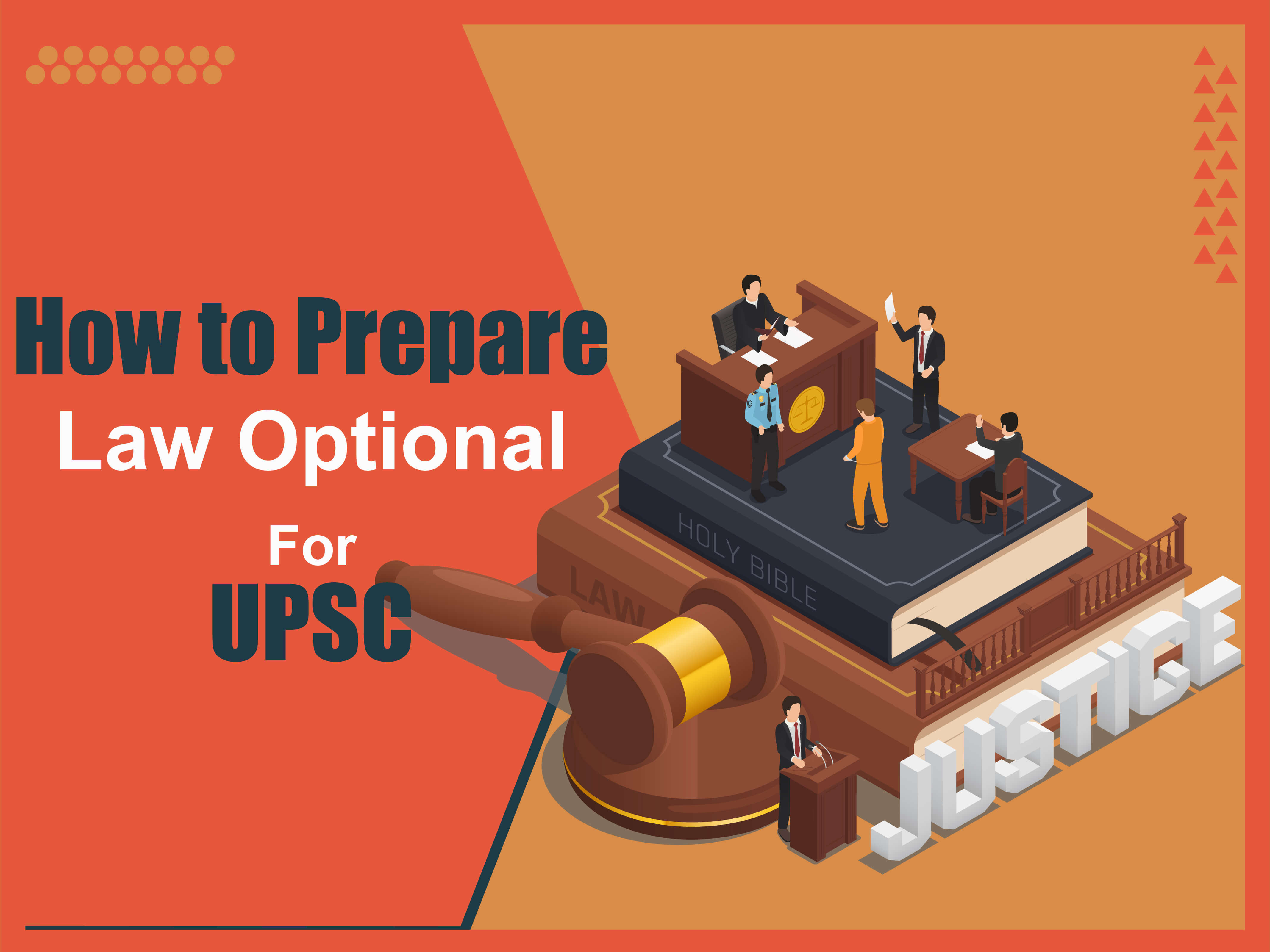
How to Prepare for Law Optional for UPSC
The law might seem like a technical subject chosen by aspirants with a law degree. However, that is far from true. The Law Optional Paper in the UPSC Main Exam is known for its high success rate. It is a popular optional subject chosen by many aspirants that does not require you to have a background in the field like the sciences but only demands your interest. If you have sheer interest in the field, you can clear the Law Optional Paper by diligently going through everything we have mentioned in the paper. Read it attentively to gain clarity on the subject and see what you can do to make it work.
The Advantages and Disadvantages of Law-Optional
This optional subject has drawn many aspirants towards itself for its success rate. However, there are a lot of advantages and disadvantages to the subject. You must decide if you can make this subject work for you. Do not follow the herd mentality and make an active decision.
The Advantages of Law Optional Paper
- nteresting Subject: Law is an important part of our society. However, its importance is not dulled by its basic and interesting nature. The subject matter does not require you to have a law degree; you just need to show interest in the subject. When you prepare for the UPSC examination, you understand some basic distinctions like ‘what is right and what is wrong', and you apply those distinctions formally with legal terminologies.
- Easy to Understand: The subject matter is very straightforward. You have to understand the law and its significance. It is an application-based subject with real-life instances. Understanding the crux of the law applied, and your opinion on these cases is what matters more than the mugging up of laws.
- Overlap with General Studies: You will find a lot of similar topics when you study for General Studies and Law Optional Paper. Topics like polity, constitution, Right to Information, governance-based issues, the power distribution between different institutes in the government, and much more.
- Less Preparation Time: The preparation time for this subject is relatively less. It will not take more than four to five months of dedicated preparation to score well in the subject.
- Helps in Essay Writing: When you prepare for the Law Optional Paper, you develop the ability to look at instances and topics from a legal, political, and economic perspective. This adds value to your essays when you write on a topic from these perspectives.
- Lots of Study Material:There are a lot of books available on the subject. You must go through the newspaper regularly and follow cases in the news to prepare for the subject.
Also Read:-
The Disadvantages of Law Optional Paper
- Heavy Legal Vocabulary: The Law Optional Paper uses a lot of legal terminologies, which might be a challenge for aspirants who are not used to the language.
- Highly Specific Answers: You must write the answer with proper legal terminologies. The answers must be to the point. You cannot beat around the bush in an answer if you attempt for the sake of it.
- Lack of Availability of Test Series: You need to practise writing answers in an exam-like situation. The more you practise like this, the higher the chance you have to clear the exam. However, there are not a lot of good test series available for the aspirants.
- The subject is not as scoring as science subjects or mathematics optional, but you can score a good 145-155 with sincere effort.

Tips For General Prep
These are tips for your overall preparation. Do not forget these pointers. They will be helpful to you. Follow these to prepare thoroughly.
-
Understand the Syllabus
It is important that you begin your prep by understanding the syllabus. You will find the syllabus on multiple reliable websites. The UPSC website will also show you the Law Optional Paper syllabus. Go through it properly to make a study plan.
-
Study Materials
There are a lot of official sources of study material available on the UPSC websites. You can get a lot of material online through different academies as well. Go through the study material available and finalise for yourself which books you want to use. We have mentioned a list of books you must use for your UPSC Law Optional preparation.
-
Give Priority to Understanding Topics Over Rote Learning
The subject matter is extensive for the law optional paper. The questions asked in the exam are application-based questions, which leave very minimal room for rote learning. You must understand the topics and learn the relevant case names. You must focus on why a particular law was applied in a case instead of simply mugging up the law. This way, you will score better.
-
Group Study
Form a group to study the subject together. Law is an opinion-based paper; the more opinions you gather, the more content you have to write in the exam. The group will also benefit similarly, and you can revise topics together and help each other with topics you find difficult. A group study session is ideal for the law optional paper.
-
Manage Your Time
Make a schedule and stick to it. You must prepare a study plan and a daily schedule. You can study effectively and track your progress for a longer period. It will also give you proper and much-needed breaks during your preparation and help you study better. It will also give you the required confidence to clear the exam.
-
Previous Year's Question Papers
You must never forget to solve as many previous year’s question papers as you can. You will get the official papers on the UPSC website. Solve all of them in a time-bound, exam-like condition. This is the way to prepare for any exam.
Books You Can Refer To For Law Optional
Any good book on law can provide you with properly articulated information from the exam perspective. However, finding good books is a challenge. There are many books out there that claim to be the ‘best book for law optional UPSC.’ We have mentioned all the books you must refer to for your law optional preparation.
- Indian Constitutional Law by MP Jain
- Administrative Law by IP Massey
- International Law by Malcolm Shaw
- International Law by SK Kapoor
- Starke’s International Law by JG Starke
- Textbook on IPC by KD Gaur
- Law of Torts by RK Bangia
- Law of Contract & Specific Relief by Avtar Singh
- The Constitution of India (Bare Act) by PM Bakshi
- Jurisprudence (Legal Theory) by B.N. Mani Tripathi
These books will be helpful for your prep. Read them thoroughly. Make sure you have taken notes. Remember to revise the notes regularly. Solve practice questions to prepare thoroughly.
Commonly Asked Questions
-
Is the Law Optional Easy?
The law optional paper is easy to study, depending on your interest. You can clear the exam with dedicated effort and proper writing practice. If you do not put in the effort, then the paper is hard to crack, as it involves a lot of reading.
-
Is there any specific undergraduate background required to choose the Law Optional Paper?
While aspirants with a background in law do have an upper hand in the paper, it should not dishearten you from choosing this optional paper. The UPSC is not expecting you to be a law graduate to write answers to the law optional paper. Besides, the paper is application-based. It’s very basic and only calls for the usage of legal terminology. The UPSC is also known to repeat the questions and avoid tough topics like taxation law.
Conclusion
You need to put in a lot of time and dedication for the law optional paper . As easy as the subject is, the technical details of the subject require you to put in effort to clear the paper with flying colours. All the details have been mentioned. Make sure to prepare well and diligently follow the steps mentioned above. They will give you the confidence to score well. Your persistent dedication will define your results. Make yourself proud of your efforts. All the best for your preparation.







 firstiasofficial@gmail.com
firstiasofficial@gmail.com